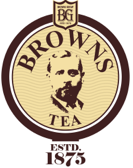the founder of the Browns Group — who was renowned for his business acumen and excellent technical skills, established a workshop in Hatton to manufacture machinery for the fledging tea industry. With the innovative machinery manufactured by James Brown, the production numbers were increased and Ceylon’s tea industry took off. The Browns Group, at every stage of its history, has provided impetus to the local economy.”
Sri Lanka is synonymous with its Ceylon Tea—the brew that put the name of the island on the world map. Needless to say, Ceylon Tea is world-renowned for its exceptional quality. As refreshing as a cup of tea, the story of Ceylon tea unveils amidst the mist-wrapped hills of central Sri Lanka. The emergence of the tea industry in Sri Lanka was a fortunate stroke of serendipity. In the 1800s, when the island was under the reign of the British monarch, the central hills were bustling with coffee plantations. The Coffee Rush was akin to the California Gold Rush and the hill country was all about thriving coffee plantations, stately bungalows, and English life. The arrival of Devastating Emily—Coffee Blight—marked the fall of the coffee industry. It was tea that came to save the day when the planters were battered by the leaf blight disaster that began to spread from estate to estate by the end of 1867.
James Taylor, a young Scottish planter started cultivating tea on an experimental plot of 15 acres in Loolecondera estate, where Ceylonese women used to pick coffee berries much as tea is plucked today. With seedlings that sprouted from Assam seeds that showed promise, Taylor was determined to try out his luck. He not only perfected the delicate art of growing tea but also realised the commercial potential of this new crop—the black gold of the island. With Taylor at the helm, the tea planters who were sanguine about prospects of the tea industry took to growing tea. No sooner, tea became their salvation, paying off their hard work. However, it was then a laborious manual process starting from harvesting regularly to rolling leaves by hand and processing tea.
Yet another serendipitous discovery made by the British tea planters, was the impact of diverse climates on tea production. This specialty in Ceylon tea cultivation resulted in the production of a range of teas, which has a distinct flavour as well as a colour unique to each agro climate area.
Started with just a few tea boxes shipped to London in 1875, Sri Lanka now exports millions of kilograms of tea each year, strengthening the local economy like no other industry. An early catalyst in the plantation sector, Browns Tea is proud to be a part of this legendary journey of Ceylon tea by manufacturing superior quality tea. Anchored to a ‘Heritage of Trust’, the Browns Group is backed by LOLC, one of the leading conglomerates in Sri Lanka boasting a global presence.
